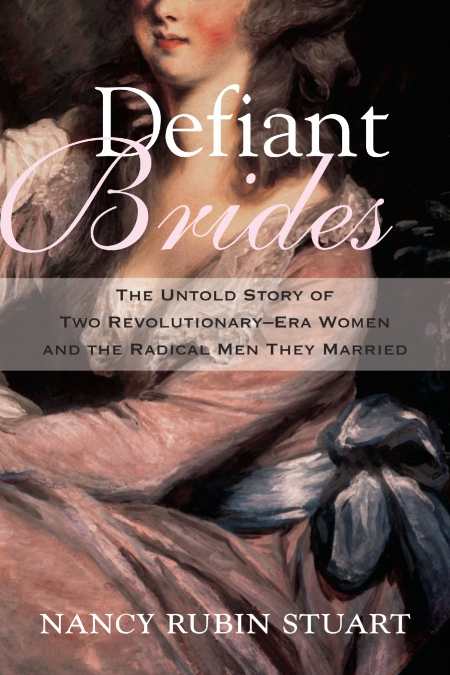Defiant Brides
The Untold Story of Two Revolutionary-era Women and the Radical Men They Married
A double biography about two young women coming of age during the turbulent Revolutionary War, neither of whom knew each other, might have presented a disjointed and confusing narrative for the reader.
But in this heavily researched volume, Nancy Rubin Stuart succeeds in rendering a clear picture of the world in which the wives of mid-eighteenth-century leaders and military officers lived, supporting their spouses in the background while being keenly aware that their presence and influence could make a difference in the events of the day and in the morale of fellow citizens.
This book chronicles the courting and eventual marriages of Peggy Shippen, daughter of a Philadelphia business leader, to Benedict Arnold, the general whose loyalties would eventually shift to the British, and Lucy Flucker to Henry Knox, a poor bookseller who would become an important general in George Washington’s wartime campaign. The feisty Knox makes a political statement of support by shaping her dark hair into a tri-cornered Continental military hat while on arduous trips through military camps. Teenaged Peggy Arnold, who later supports her husband and his act of treason and empathy for the British, conveys wit, charm, and a love of the finer things in life, while helping his career aspirations.
But Peggy Arnold grows, too. The author describes her as evolving from a “fragile, compliant bride” to, later in life, a person with “fortitude.”
A specialist in women’s and social history, the author studies the correspondence of these two women, their family members and friends, various historical accounts of the time, and numerous other documents to ferret out the role these and other women played. Her goal was to depict them as “human beings, as vulnerable, fallible, and praiseworthy as we are today.”
The importance of personal letters between frequently separated married couples of that period, like the Knoxes and Arnolds, cannot be overstated in capturing the frustrations of war and the challenges of maintaining a close relationship. When Lucy Knox does not get any mail from her husband for a long time, fearing abandonment, she writes him: “Oh, horrid war! How has thou blasted the fairest prospect of happiness, robbed of parents, of sisters and brother, thou art depriving me, of the society of my husband: who alone could repair the loss.”
From the perspectives of these two distinctly different personalities, the author breathes life into a complex period of history as the reader watches an emerging nation take shape.
Reviewed by
Karl Kunkel
Disclosure: This article is not an endorsement, but a review. The publisher of this book provided free copies of the book to have their book reviewed by a professional reviewer. No fee was paid by the publisher for this review. Foreword Reviews only recommends books that we love. Foreword Magazine, Inc. is disclosing this in accordance with the Federal Trade Commission’s 16 CFR, Part 255.

